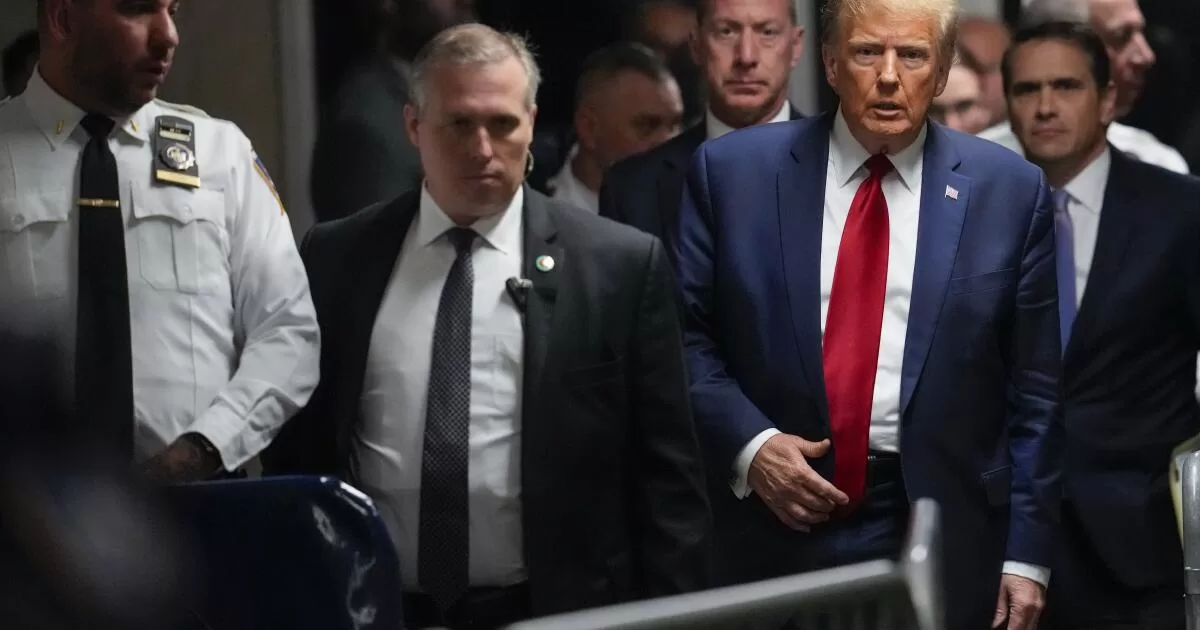Judge Juan Manuel Merchan agreed to a 30-day postponement and scheduled a hearing for March 25 to address questions about the evidence dump. The trial had been slated to start on March 25. It is among four criminal indictments against Trump, the presumptive 2024 Republican presidential nominee.
Trump’s lawyers wanted a 90-day delay, which would have pushed the start of the trial into the early summer. Prosecutors said they were OK with a 30-day adjournment “in an abundance of caution and to ensure that defendant has sufficient time to review the new materials.”
Trump’s legal team said it has received tens of thousands of pages of evidence in the last two weeks from the U.S. attorney’s office in Manhattan, which investigated the hush-money arrangement while Trump was president.
The evidence includes records about former Trump lawyer Michael Cohen that it says are “exculpatory and favorable to the defense.” Prosecutors said most of the newly turned over material is “largely irrelevant to the subject matter of this case.”
The hush-money case centers on allegations that Trump falsified his company’s records to hide the true nature of payments to Cohen, who paid porn actor Stormy Daniels $130,000 late in the 2016 presidential campaign to suppress her claims of an extramarital sexual encounter with Trump years earlier.
Trump pleaded not guilty last year to 34 felony counts of falsifying business records. He has denied having a sexual encounter with Daniels, and his lawyers argue the payments to Cohen were legitimate legal expenses and not part of any cover-up.
Prosecutors contend Trump’s lawyers caused the problem that led to Friday’s delay by waiting until Jan. 18 to subpoena the U.S. attorney’s office for the full case file — a mere nine weeks before the scheduled start of jury selection.
Dist. Atty. Alvin Bragg’s office said it requested the full file last year, but the U.S. attorney’s office only turned over a portion of the records. Trump’s lawyers received that same material last June and had ample time to seek additional evidence from the federal probe, the D.A.’s office said.
Short trial delays because of evidence issues aren’t unusual, but any delay in a case involving Trump would be significant, with trial dates in his other criminal cases up in the air and election day less than eight months away.
The defense has also sought to delay the trial until after the Supreme Court rules on Trump’s presidential immunity claims, which his lawyers say could apply to some of the allegations and evidence in the hush-money case. The Supreme Court is scheduled to hear oral arguments April 25.
Trump has repeatedly sought to delay the start of his criminal trials.
“We want delays,” Trump said to reporters at a pretrial hearing in the New York case on Feb. 15. “Obviously I’m running for election. How can you run for election if you’re sitting in a courthouse in Manhattan all day long?”
The deluge of evidence that spurred Trump’s lawyers to request a delay pertains to a federal investigation into the hush-money matter that sent Cohen to prison.
After a decade of working for Trump, Cohen broke with his boss in 2018 and soon pleaded guilty to campaign finance violations related to the hush-money payments, making false statements on a bank loan application, evading taxes related to his investments in the taxi industry and lying to Congress. The contributions were in the form of payouts to women who said they had extramarital sexual encounters with Trump, who denied them.
Cohen served about a year in prison before being released to home confinement because of the COVID-19 pandemic. He became an outspoken Trump foe and is poised to be a key prosecution witness in the hush-money trial. Trump and his lawyers, meanwhile, have portrayed Cohen as untrustworthy.
Although federal prosecutors said in their case against Cohen that the hush-money payments were done to benefit Trump and occurred with his knowledge, they stopped short at the time of accusing Trump of directly committing a crime.
The Justice Department’s Office of Legal Counsel, which provides legal advice and guidance to executive branch agencies, has maintained that a sitting president cannot be indicted. The U.S. attorney in Manhattan didn’t revive the investigation once Trump left the White House.
Sisak, Peltz and Offenhartz write for the Associated Press.
